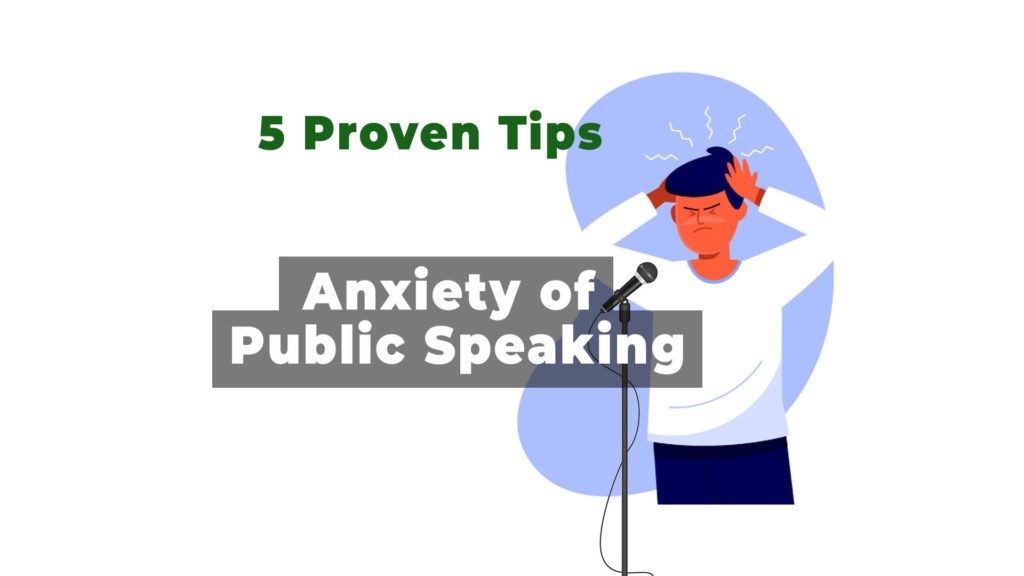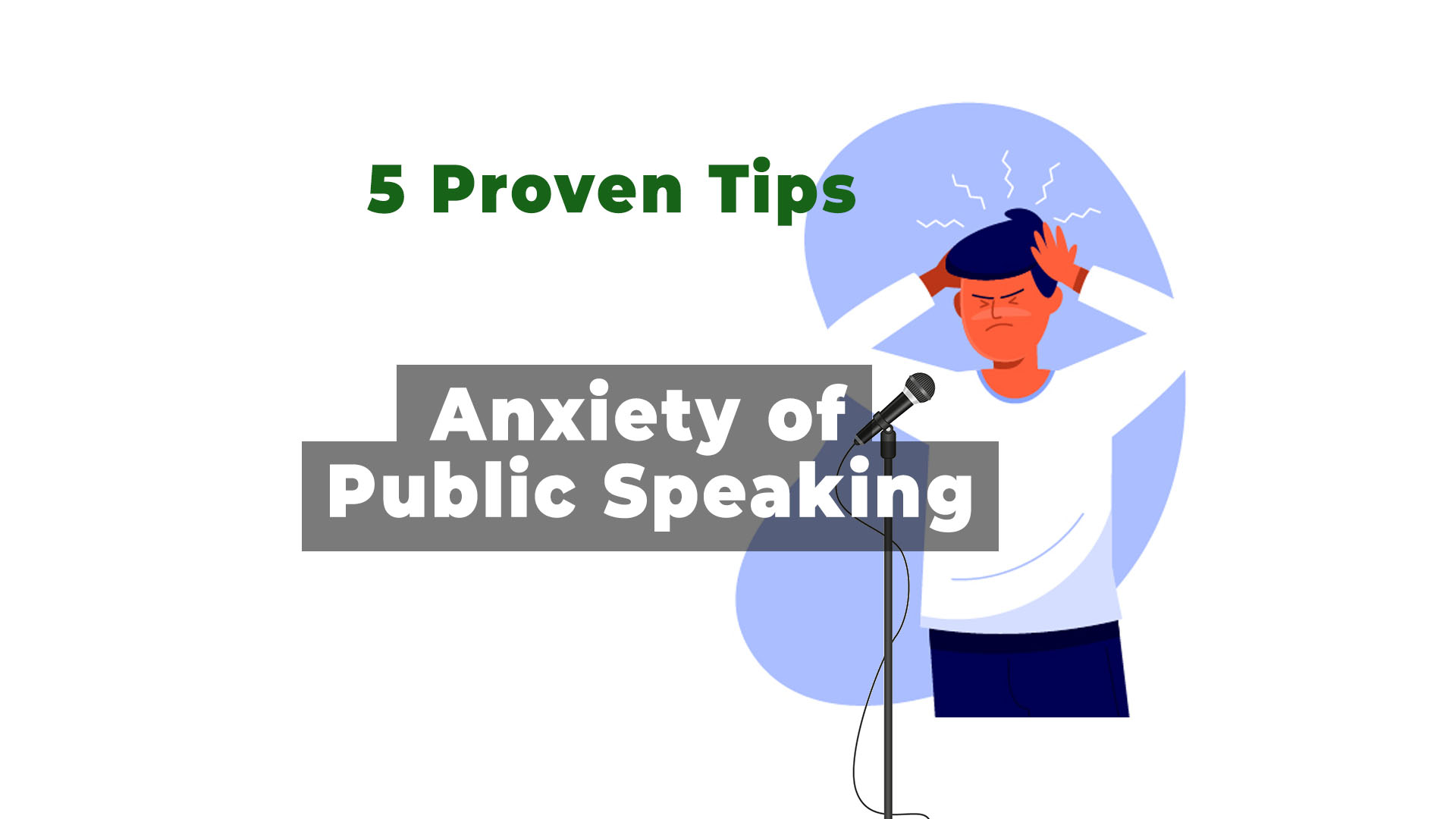Firstly, we should know that we all are in the same boat. Even the most professional public speakers still face some anxiety when they are on stage. However, what really sets them apart is how they manage the anxiety of public speaking. Read more to find out some proven ways to overcome the fear of speaking publicly.
Contents
Why do we feel anxious when we face the public?
Psychologists have found some reasons for the fear of public speaking. Here are some of the reasons and how it gets manifested into the anxiety of public speaking:
- Social anxiety
- Body’s natural response

Social anxiety as a cause of anxiety of public speaking
Ever felt that you are absolutely fine when talking with your friends, team, and family members. On the other hand, you take a small gulp when your boss asks you to speak at a town hall meeting. The reason is social anxiety. Our mind can model and predict the behavior of a smaller group of known people much better than a large group. This uncertainty creates social anxiety.
Tip 1: Picture the group as individual people
First of all, you should try to focus your eyes on known people in the group. This will boost your confidence. Spend at least half of your time looking at them, the rest of the time on others. Secondly, try to understand that every group is essentially a collection of people. Convince yourself that you are talking to people not a crowd. Thirdly, pass the buck on them and make the discussion two-sided. Ask them a question and seek responses from the audience. The more interactive you make your speech, you will have lesser anxiety. The reason is that your mind starts modeling the public response. Take this as a feedback and deliver your next lines as per public response. It will also make your delivery very powerful.
Body’s natural response as due to anxiety of public speaking
We had earlier discussed that even the most seasoned speakers are anxious. This arises due to social anxiety. However, anxiety leads to a physiological response. In order words, the hormones in our bodies start misbehaving when it senses that we have to face the public. The fear of facing the public leads to an arousal of the autonomic nervous system. Especially, it triggers the sympathetic nervous system. One that is responsible for fight or flight response. It is the same reason why we feel so anxious.
Arousal prepares us for facing this uncomfortable situation. However, there are some side effects of the aroused state. These changes are shortening of breath, an increase in heart rate, and sometimes physical discomfort. Here are some tips to overcome the body’s response to the threats.
Tip2: Fool your body in 30 seconds!
Prof Amu Cuddy of Harvard Business School gave an excellent hack to increase confidence. You need to stand tall and spread your legs to shoulder width. Take your hand out. Lift your hands above into a V-shape. Essentially do a victory pose. Imagine a sportsperson shouting with confidence after winning a trophy. Try to internalize this victory and stand like this for 30 seconds or so. You can even vocalize a ‘Yaay’ into your head (or shout out loud if possible.) However, this exercise is best done in the places where you are not seen by people. Otherwise, some may think you are crazy! Nevertheless, it does work, so no harm in giving it a try.

The next tip is more useful if you are just about to speak. Otherwise, you have been given an impromptu opportunity. Your heart starts pounding, moments before going on stage or holding the mic. You can’t do a victory pose in this situation. However, there is another, subtle solution: controlled breathing.
Tip 3: Let your lungs help you
You cannot directly regulate your hormones. Neither can you regulate your heart rate. However, you can control your breathing! This is indeed quite useful to reduce the anxiety of public speaking. Here is a simple way to regulate your breathing to get optimal results: breath out slowly. This will calm you down quickly. The reason is that the breathing out process is linked with our parasympathetic nervous system, which helps us relax. This is the opposite of the sympathetic nervous system. Yes, the one that made you anxious in the first place. This also helps the brain as it gets more oxygen. There are more nuanced ways to regulate breathing. However, here we are discussing the most effortless and fast one.
Long term solution to the anxiety of public speaking
The best way to be confident during public speaking is to skill yourself. You need to use your body to signal confidence. Spend some time in the mastery of body language. You can read our article on the science of body language to get started. Here are some more tips to reduce your anxiety of public speaking in the long run:
Tip 4: Join a help group
People swear by this method. It is highly useful and result oriented. Toastmaster is a name that comes to mind first. It is the world’s largest community of like-minded people. You can search online to find a local center in your city. Pay the annual membership fee. Generally, the groups meet once every week. There are activities, social feedback, and competitions. All of these help you shape a speaker in you. You will have higher confidence and lower anxiety. Additionally, you will also master the art of public speaking. If you don’t have a Toastmaster near you, you can search for other public speaking help groups.
Tip 5: Prepare, Practice and Practice
One of the most iconic public speeches is the iPhone launch of 2007. It changed the course of history. Not just for Apple but for the world. Smartphones are now the most important devices. It is said that a LOT of work went behind the preparation of the presentation. Steve Jobs spent countless hours practicing it. Every small detail was carefully crafted. Matt Drance who worked on a part of the presentation, recalls the journey. He put in over 72 sleepless hours to create a point. Steve presented this point for only 9 seconds. The better you prepare, the lower is your anxiety. Also, the more you practice, the lower is your fear of delivering the speech. This simple mantra of prepare, practice, and practice can go a long way in helping you control the anxiety of public speaking.
